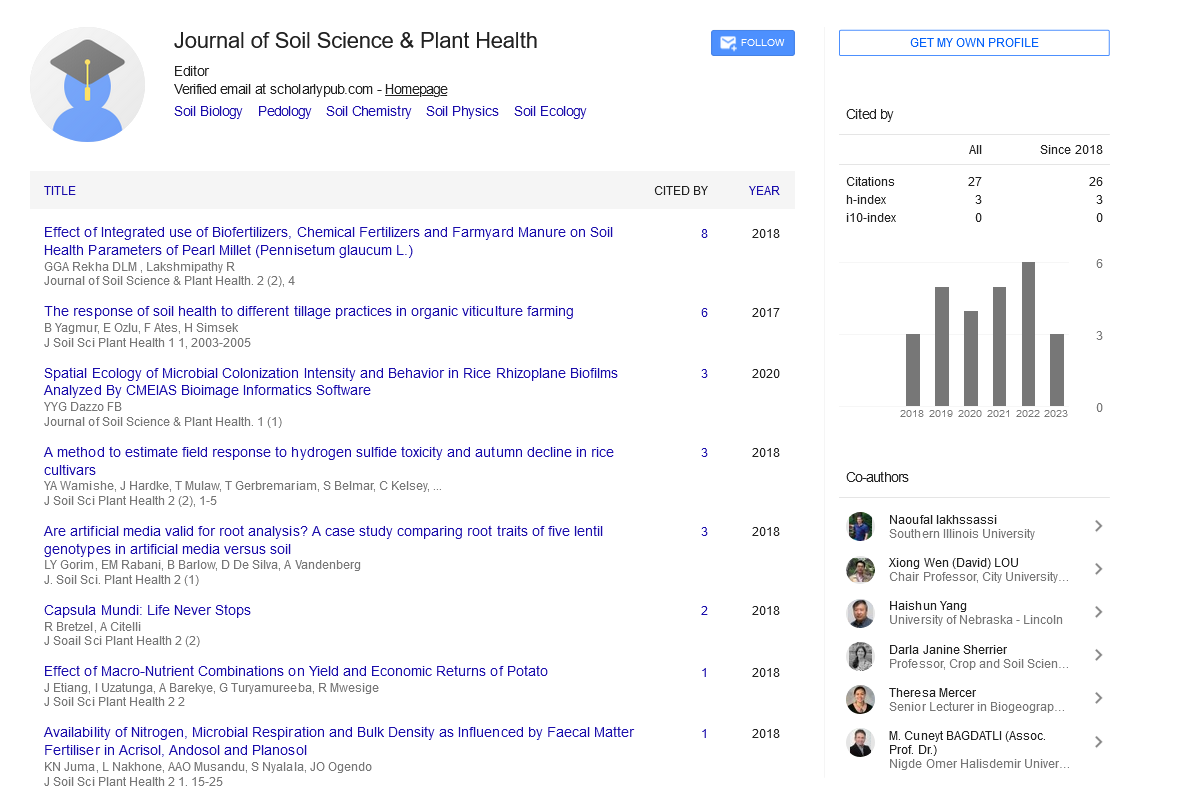Perspective, J Soil Sci Plant Nutr Vol: 7 Issue: 3
Soil Management Strategies for Climate Change Adaptation in Agriculture
Wanlin Wang*
1Department of Economics, Shandong University of Technology, Shandong, China
*Corresponding Author: Wanlin Wang,
Department of Economics, Shandong
University of Technology, Shandong, China
E-mail: wang@wanlin.edu.in
Received date: 28 May, 2023, Manuscript No. JSPH-23-106974
Editor assigned date: 31 May, 2023, Pre QC No. JSPH-23-106974 (PQ);
Reviewed date: 14 June, 2023, QC No. JSPH-23-106974
Revised date: 22 June, 2023, Manuscript No. JSPH-23-106974 (R);
Published date: 28 June, 2023, DOI: 07.4172/jsph.1000197
Citation: Wang W (2023) Soil Management Strategies for Climate Change Adaptation in Agriculture. J Soil Sci Plant Nutr 7:3.
Description
Climate change is a global phenomenon that poses significant challenges to agriculture. Rising temperatures, altered precipitation patterns, and extreme weather events have direct impacts on soil health and agricultural productivity. To mitigate the adverse effects of climate change and ensure food security, it is essential to develop and implement effective soil management strategies. This study discuss the various soil management practices that can help agriculture adapt to the changing climate, enhance soil resilience, and promote sustainable agricultural systems.
Conservation tillage practices involve reducing or eliminating the intensity of soil disturbance during planting and cultivation. These practices include minimum tillage, no-till, and strip-till systems. Conservation tillage helps to preserve soil structure, reduce erosion, and enhance water retention in the soil. By leaving crop residues on the soil surface, conservation tillage also increases organic matter content, which improves soil fertility and moisture-holding capacity. Cover crops are crops grown primarily to cover the soil during fallow periods or between cash crops. They play a vital role in climate change adaptation by reducing soil erosion, improving water infiltration, and increasing soil organic matter. Cover crops capture and store carbon from the atmosphere, thereby mitigating greenhouse gas emissions. Additionally, cover crops enhance nutrient cycling, suppress weeds, and improve soil structure, leading to increased soil health and productivity.
Crop rotation involves the systematic sequencing of different crops on the same land over time. This practice helps to break pest and disease cycles, improve soil nutrient balance, and reduce reliance on synthetic fertilizers and pesticides. Crop rotation can enhance soil organic matter content, nutrient availability, and overall soil health. By diversifying the crop species, farmers can adapt to changing climatic conditions and reduce the vulnerability of their agricultural systems. Agroforestry is an integrated land management system that combines trees or shrubs with crops or livestock. This practice provides numerous benefits in the face of climate change. Trees in agroforestry systems contribute to carbon sequestration, reduce soil erosion, and provide shade and windbreaks. The shade from trees helps to moderate soil temperatures, conserve soil moisture, and protect crops from extreme weather events. Agroforestry systems also enhance biodiversity, provide habitat for beneficial organisms, and improve overall ecosystem resilience.
Increasing soil organic matter content is essential for building soil resilience to climate change. Organic matter improves soil structure, water-holding capacity, nutrient retention, and biological activity. Practices such as incorporating crop residues, applying organic amendments (e.g., compost, manure), and practicing green manure cover cropping can significantly increase soil organic matter levels. By maintaining high organic matter content, farmers can enhance soil fertility, carbon sequestration, and climate change adaptation capacity.
Water scarcity is a major concern in many regions due to climate change. Implementing efficient irrigation practices, such as drip irrigation, precision irrigation, and soil moisture sensors, can help optimize water use in agriculture. These practices ensure that water is applied precisely where and when needed, minimizing evaporation and runoff. Proper irrigation management also prevents waterlogging, which can lead to soil degradation. By improving water-use efficiency, farmers can adapt to changing precipitation patterns and reduce their reliance on dwindling water resources. Balanced nutrient management is essential for optimizing crop productivity and reducing environmental impacts. Precision nutrient application techniques, such as site-specific nutrient management and soil testing, help farmers tailor fertilizer use to match crop nutrient requirements. This practice minimizes nutrient losses, reduces the risk of nutrient runoff into water bodies, and ensures efficient use of fertilizers. By maintaining optimal nutrient levels, farmers can enhance crop resilience to climate change, promote sustainable nutrient cycling, and minimize nutrient imbalances.
Adapting to climate change in agriculture requires proactive soil management strategies that promote soil health, enhance resilience, and optimize resource use. Conservation tillage, cover cropping, crop rotation, agroforestry, organic matter management, efficient irrigation practices, and balanced nutrient management are essential components of climate change adaptation in agriculture. By implementing these practices, farmers can mitigate the adverse effects of climate change, maintain productivity, and contribute to sustainable and resilient agricultural systems. Continued research, knowledge sharing, and policy support are dire for widespread adoption of these soil management strategies and the long-term sustainability of agriculture in a changing climate.
 Spanish
Spanish  Chinese
Chinese  Russian
Russian  German
German  French
French  Japanese
Japanese  Portuguese
Portuguese  Hindi
Hindi 